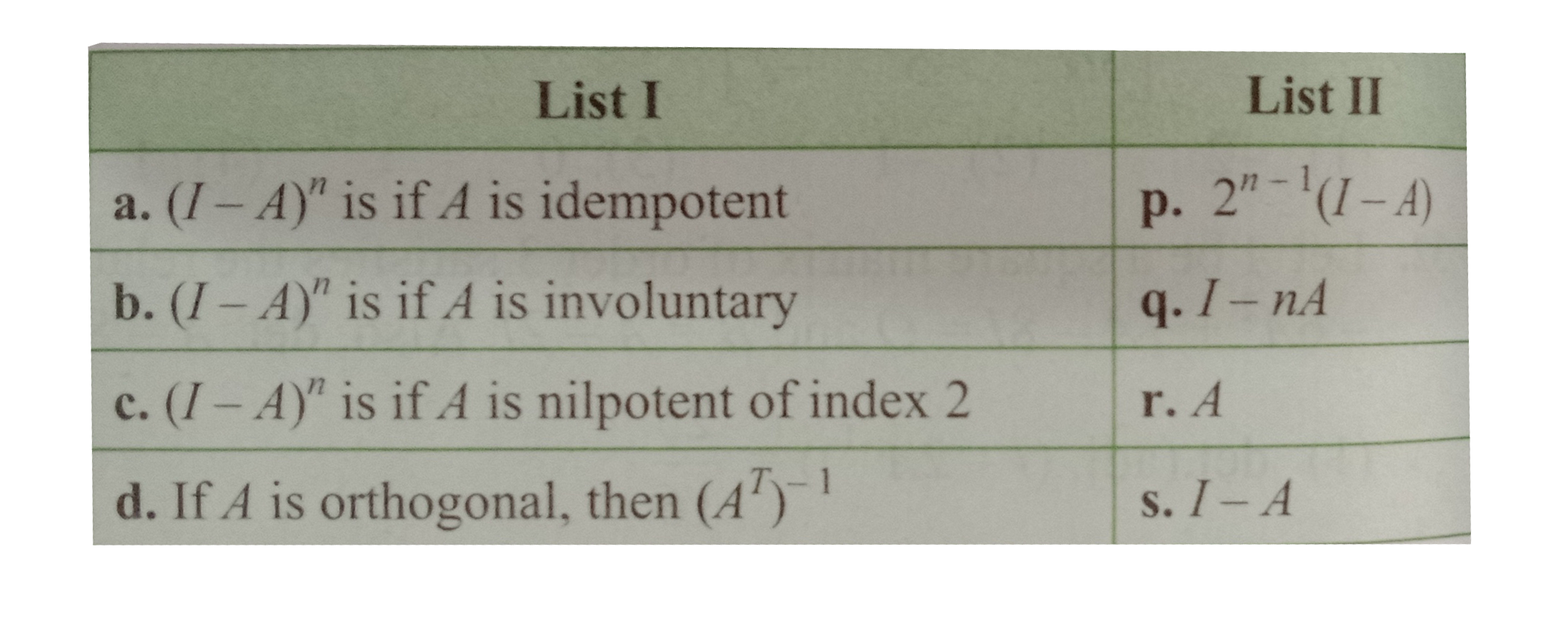If A(θ)=[sinθicosθicosθsinθ], then which of the following is not true ?Solution in Tamil
A(θ)−t=A(π−θ)
A(θ)+A(π+θ) is a null matrix
A(θ) is invertible for all θ∈R
A(θ)−1=A(−θ)
The correct Answer is:A, B, C
We have, |A(θ)|=1
Hence, A is invertiable.
A(π+θ)=A(π+θ)=[sin(π+θ)icos(π+θ)icos(π+θ)sin(π+θ)]
=[−sinθ−icoθ−icosθ−sinθ]=−A(θ)
adj (A(θ))=[sinθ−icosθ−icosθsinθ]
⇒A(θ)−1=[sinθ−icosθ−icosθsinθ]=A(π−θ)
Topper's Solved these Questions
- MATRICESBOOK - CENGAGECHAPTER - MATRICESEXERCISE - Exercise (Comprehension)
18 Videos
- MATRICESBOOK - CENGAGECHAPTER - MATRICESEXERCISE - Exercise (Matrix)
5 Videos
- MATRICESBOOK - CENGAGECHAPTER - MATRICESEXERCISE - Exercise (Single)
65 Videos
- MATHMETICAL REASONINGBOOK - CENGAGECHAPTER - MATHMETICAL REASONINGEXERCISE - JEE Previous Year
10 Videos
- METHODS OF DIFFERENTIATIONBOOK - CENGAGECHAPTER - METHODS OF DIFFERENTIATIONEXERCISE - Multiple Correct Answer Type
7 Videos
Similar Questions
Let a be a matrix of order 2×2 such that A2=O.
A2−(a+d)A+(ad−bc)I is equal to
View SolutionMatch the following lists :

View SolutionIf A is symmetric as well as skew-symmetric matrix, then A is
View SolutionStatement-1: ~(p↔~q) is equivalent to (p↔q).
Statement-2: ~(p↔~q) is a tautology.
View SolutionEvaluate: ∫[√1+x2+x]n√1+x2dx
View Solution[(1 + cos theta + i sin theta) / (sin theta + i (1 + cos theta))] ^ (4) = cos n theta + i sin n theta
View SolutionIf(cos theta+i sin theta)(cos2 theta+i sin2 theta).....(cos n theta+i sin n theta)=1 then the value of theta is:
View Solution(cos theta + i sin theta) (cos3 theta + i sin3 theta) .......... (cos (2r-1) theta + i sin (2r-1) theta) = 1
View Solution((cos theta + i sin theta) / (sin theta + i cos theta)) ^ (4) = cos8 theta + i sin8 theta
View SolutionIf A(θ)=[sinθicosθicosθsinθ], then which of the following is not true ?
View SolutionProve each of the following identities :
(i)1+cosθ+sinθ1+cosθ−sinθ=1+sinθcosθ
(ii)sinθ+1−cosθcosθ−1+sinθ=1+sinθcosθ
View Solution(i) ∣∣∣cosθ−sinθsinθcosθ∣∣∣
View Solutioncosθ+sinθcosθ−sinθ−cosθ−sinθcosθ+sinθ=
View SolutionIf (1+cosθ+isinθi+sinθ+icosθ)=cosnθ+isinnθ then n is equal to :
View Solution" (i) "(cos theta+sin theta)/(cos theta-sin theta)
View Solution
